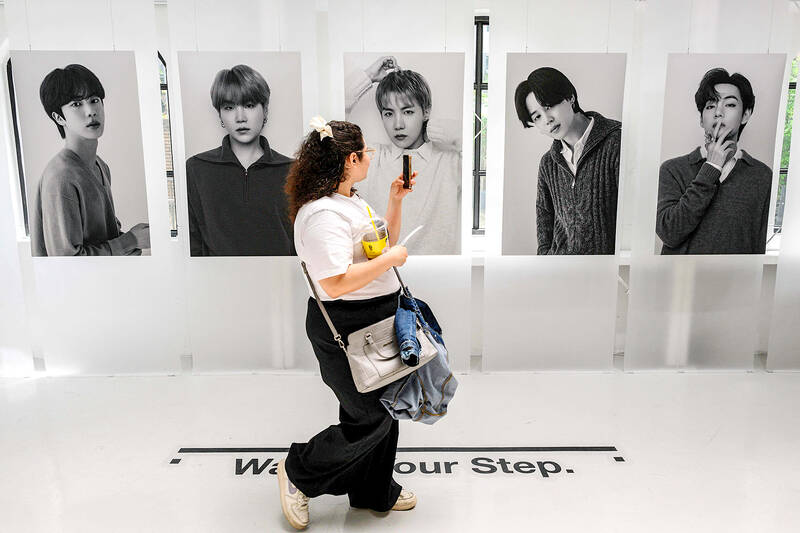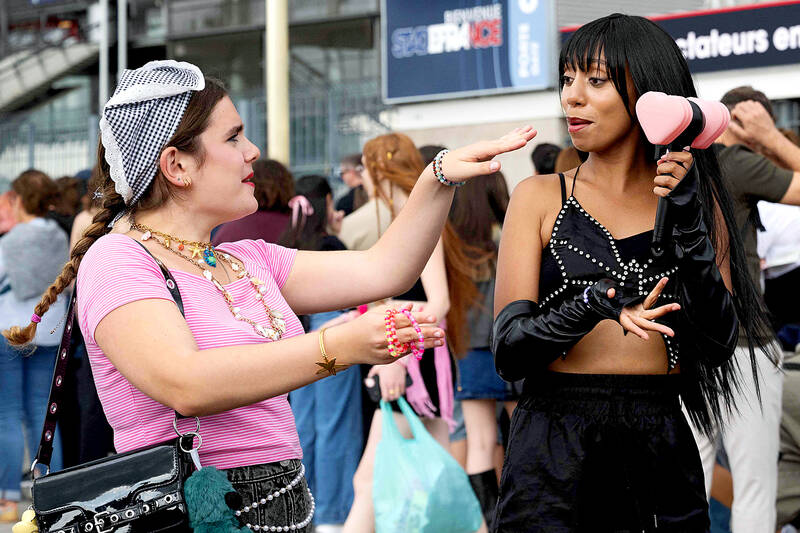In a gleaming, mirror-lined studio above Singapore’s Orchard Road, Gabriella Tjokrohadi moves through a carefully practiced routine as an instructor calls out cues in Korean. When the music cuts, she rushes to the camera to study the footage, scrutinizing every angle, posture and facial expression.
The 25-year-old Indonesian has long dreamed of breaking into South Korea’s entertainment industry. But instead of Seoul, her journey has led her to Singapore — home to Southeast Asia’s first K-pop training academy, opened in June by SM Entertainment Co, the company behind acts like Girls’ Generation and EXO.
Tjokrohadi received a S$500 (US$390) scholarship from SM to attend a week-long bootcamp — a crash course in the Korean idol system, combining intense dance and vocal sessions with lessons on videography, modeling and media presence. The grant didn’t cover travel or housing, so she stayed with a friend to keep costs down.

Photo: AFP
“Twenty five is considered old in the industry,” she said. “As long as I have the chance, I’m always willing to take it.”
Singapore, already a tour stop for global stars like Taylor Swift and K-pop artists Blackpink and TWICE, is emerging as a hub for developing talent, offering connectivity and access to a wide pool of aspiring stars across Southeast Asia.
“The goal is to use this as a scouting ground to broaden the overall talent pool that they have,” said Jonathan Ang, the academy’s director, referring to SM’s global ambitions.

Photo: AP
For years, South Korea’s idol training system was run almost entirely out of Seoul. With global demand for K-pop soaring, industry giants like SM and BTS label Hybe Co have started looking overseas. Hybe debuted a US-based girl group Katseye last year, while other agencies are scouting talent from Japan, China and increasingly, Southeast Asia. Thailand has produced some of the most successful idols, with Blackpink’s Lisa leading the way.
K-pop’s cultural footprint continues to grow. A Netflix film about a fictional girl group became the platform’s most-watched original animated title of all time. BTS’s return from mandatory military service sparked fan celebrations from Los Angeles to Sydney. Between 2019 and 2023, revenue for Korea’s four biggest K-pop music agencies nearly tripled to US$3 billion, according to Morgan Stanley.
SM’s Singapore academy offers one-week programs priced between S$1,000 and S$1,200, with plans to launch three to six-month programs by the end of the year. Top trainees may get auditions with SM or other labels. Talent searches are set to expand to Malaysia and the Philippines.

Photo: AFP
To give the program more clout, SM has flown in at least 10 staff from Korea, including veteran producers and choreographers who have helped shape some of the label’s biggest stars.
“There is a demand because you can’t get this outside of Korea today,” Ang said.
UNCERTAIN PATH
But the path isn’t easy. The arts still carry a cultural stigma in Singapore. A graduate employment survey last year found that those working in music, design and media reported the lowest gross monthly median salaries across all fields.
South Korea faces similar tensions. Even with a well-established entertainment industry, many parents still discourage their kids from pursuing careers as actors or idols. But as K-pop’s global expansion continues, it’s creating new roles, such as song production and talent management. Hundreds of graduates apply for entry-level positions in South Korea’s largest entertainment companies every year, said Park Sun-min, visiting fellow at the National University of Singapore’s communications and new media department.
In Singapore, some see the arrival of the K-pop production system as a way to strengthen the country’s still-developing creative industry — one driven more by independent artists and institutions than commercial studios.
“It’s not that the talent isn’t here,” said Justin Deimen, managing partner at entertainment financier Goldfinch International. “It’s that the scaffolding and follow-through around the talent has been missing.”
Singapore’s Ministry of Culture, Community and Youth said it’s not involved in the setting up of the K-Pop Academy. The ministry’s focus is on “nurturing homegrown talent and original creations,” it said.
What’s being taught at the academy isn’t just song and dance. Students learn to perform for the camera, craft their image and think like professionals. More importantly, for students like Tjokrohadi, it’s a foot in the door.
“The teachers here have all worked behind the scenes with big artists,” she said. “What opportunity would I have other than this?”

Dec. 8 to Dec. 14 Chang-Lee Te-ho (張李德和) had her father’s words etched into stone as her personal motto: “Even as a woman, you should master at least one art.” She went on to excel in seven — classical poetry, lyrical poetry, calligraphy, painting, music, chess and embroidery — and was also a respected educator, charity organizer and provincial assemblywoman. Among her many monikers was “Poetry Mother” (詩媽). While her father Lee Chao-yuan’s (李昭元) phrasing reflected the social norms of the 1890s, it was relatively progressive for the time. He personally taught Chang-Lee the Chinese classics until she entered public

Last week writer Wei Lingling (魏玲靈) unloaded a remarkably conventional pro-China column in the Wall Street Journal (“From Bush’s Rebuke to Trump’s Whisper: Navigating a Geopolitical Flashpoint,” Dec 2, 2025). Wei alleged that in a phone call, US President Donald Trump advised Japanese Prime Minister Sanae Takaichi not to provoke the People’s Republic of China (PRC) over Taiwan. Wei’s claim was categorically denied by Japanese government sources. Trump’s call to Takaichi, Wei said, was just like the moment in 2003 when former US president George Bush stood next to former Chinese premier Wen Jia-bao (溫家寶) and criticized former president Chen

Politics throughout most of the world are viewed through a left/right lens. People from outside Taiwan regularly try to understand politics here through that lens, especially those with strong personal identifications with the left or right in their home countries. It is not helpful. It both misleads and distracts. Taiwan’s politics needs to be understood on its own terms. RISE OF THE DEVELOPMENTAL STATE Arguably, both of the main parties originally leaned left-wing. The Chinese Nationalist Party (KMT) brought together radicals, dissidents and revolutionaries devoted to overthrowing their foreign Manchurian Qing overlords to establish a Chinese republic. Their leader, Sun Yat-sen

Late one night in April 2020, towards the start of the COVID lockdowns, Shanley Clemot McLaren was scrolling on her phone when she noticed a Snapchat post by her 16-year-old sister. “She’s basically filming herself from her bed, and she’s like: ‘Guys you shouldn’t be doing this. These fisha accounts are really not OK. Girls, please protect yourselves.’ And I’m like: ‘What is fisha?’ I was 21, but I felt old,” she says. She went into her sister’s bedroom, where her sibling showed her a Snapchat account named “fisha” plus the code of their Paris suburb. Fisha is French slang for